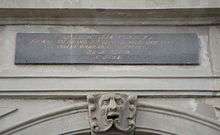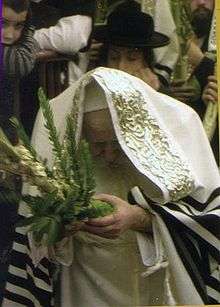Psalm 118

Psalm 118 is the 118th psalm of the Book of Psalms. Its themes are thanksgiving to God and reliance on God rather than on human strength.
Theme and Structure
This psalm is centered on God, in a movement that expresses gratitude, admiration, joy and praise. In the translation of King James, we read of the Lord in every verse. Its benefits are magnified, the narrator testifies that he benefits from it and exhorts to enter into the same attitude of praise.
The Psalm is one of the so-called Egyptian Hallel.
Verse 5
- I called on the Lord in distress;
- The Lord answered me and set me in a broad place.[1]
Verse 14
- The Lord is my strength and song,
- And He has become my salvation.[2]
These words are parallelled in the Song of Moses (Exodus 15:2) and are used by the prophet Isaiah in Isaiah 12:2.[3]
Verse 22
- The stone which the builders rejected
- Has become the chief cornerstone.[4]
Verse 23
- This was the Lord’s doing;
- It is marvelous in our eyes.[5]
Uses
Judaism

This psalm 118 is the last in the series of the Egyptian hallel, it is read in full the days of recitation of the hallel, the last ten verses are even read twice.[6]
- Is one of six psalms (113-118) of which Hallel is composed. On all days when Hallel is recited, this psalm is recited in its entirety, with the final ten verses being recited twice each.[7]
- Verse 1 is recited by some following Psalm 126 preceding Birkat Hamazon.[8]
- Verse 5 is recited prior to the Shofar blowing on Rosh Hashanah.[9]
- Verses 5-9 are part of Tashlikh.[10]
- Verse 24 may be a source of the Israeli song Hava Nagila
- Verse 25 is part of the long Tachanun recited on Mondays and Thursdays.[11]
New Testament
_Sovereign_of_Elizabeth_I.jpg)
This Psalm was quoted by Jesus and writers of the New Testament. In Matthew 21:42, Jesus said to them (the chief priests and the elders of the people), "Have you never read in the Scriptures: "'The stone that the builders rejected has become the cornerstone; this was the Lord’s doing, and it is marvelous in our eyes'?" Opposition and difficulties are seen in this Psalm but in the midst of it God will display His salvation. This verse is also referred to in Mark 12:10, Luke 20:17, Acts 4:11, and 1 Peter 2:7.
In Matthew 21:9, Mark 11:9-10 and John 12:13, Jesus is welcomed on his triumphal entry into Jerusalem by crowds quoting verse 26:
Catholicism
This psalm was chosen by St Benedict towards 530, as the third psalm during the solemn office of the Sunday laudes (Rule of Saint Benedict, chapter XI10).[14]
Psalm 118 (117) is now read in the liturgy of the Hours every Sunday of the first and third weeks, at the office of Sext.[15]
Anglicanism
An extract from verse 23 is inscribed on several English coins, with the text of the Vulgate: a Domino factum est istud hoc est mirabile in oculis nostris. Upon her accession to the throne, Elizabeth I of England is said to have pronounced this same verse, also in Latin, as quoted in the New Testament: A Domino factum est illud et est mirabile in oculis nostris.[16]
Verses 8 and 9 are notable as the centre verses of the Protestant Bible (e.g. King James Bible).
Music
The Psalm 118 (117) was set to music by various composers including the motet of Lobet den Herrn, and alle Heiden (BWV 230) by Johann Sebastian Bach.
References
- ↑ Psalm 118:5
- ↑ Psalm 118:14
- ↑ Keil and Delitzsch OT Commentary, Isaiah 12, accessed 23 March 2018
- ↑ Psalm 118:22
- ↑ Psalm 118:23
- ↑ D’après le Complete ArtScroll Siddur, compilation des prières juives, p. 638-640.
- ↑ The Complete Artscroll Siddur page 638-40
- ↑ The Complete Artscroll Siddur page 183
- ↑ The Complete Artscroll Machzor for Rosh Hashanah page 435
- ↑ The Complete Artscroll Siddur page 771.
- ↑ The Complete Artscroll Siddur page 131
- ↑ D’après le Complete ArtScroll Siddur, compilation des prières juives, p. 131.
- ↑ John Calvin, Commentaire des psaumes, 1557.
- ↑ Prosper Guéranger, Traduction par Dom (Abbaye Saint-Pierre de Solesmes, réimpression 2007) p.40.
- ↑ Le cycle principal des prières liturgiques se déroule sur quatre semaines.
- ↑ « On This Day: Elizabeth I Becomes Queen of England, 10 November 2010
External links
| Wikimedia Commons has media related to Psalm 118. |